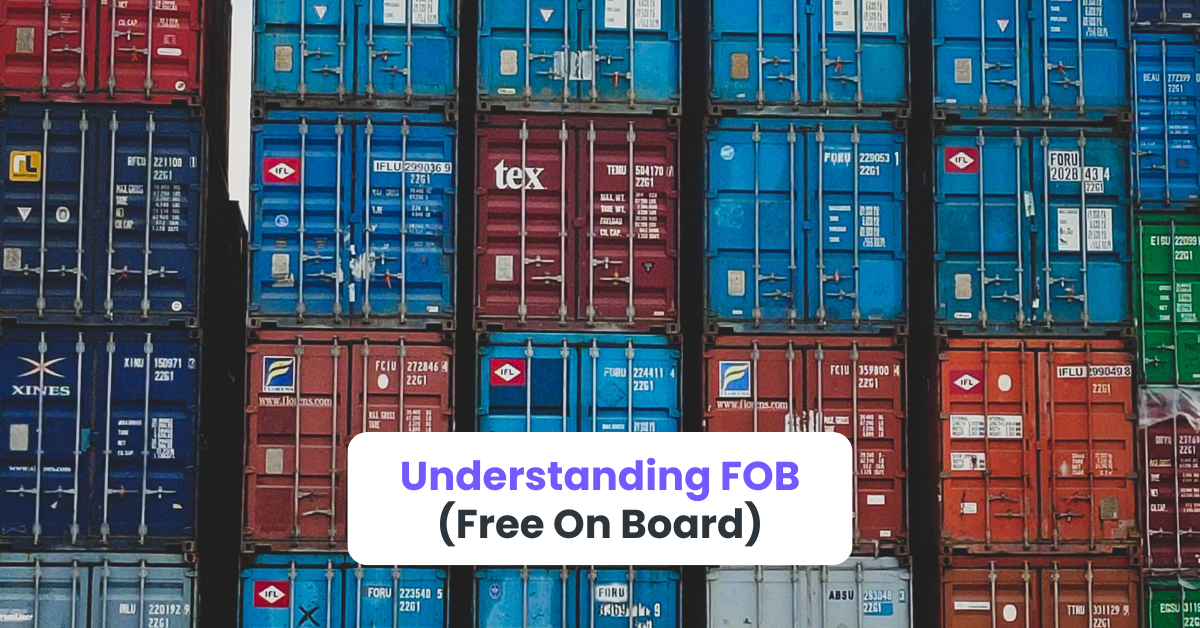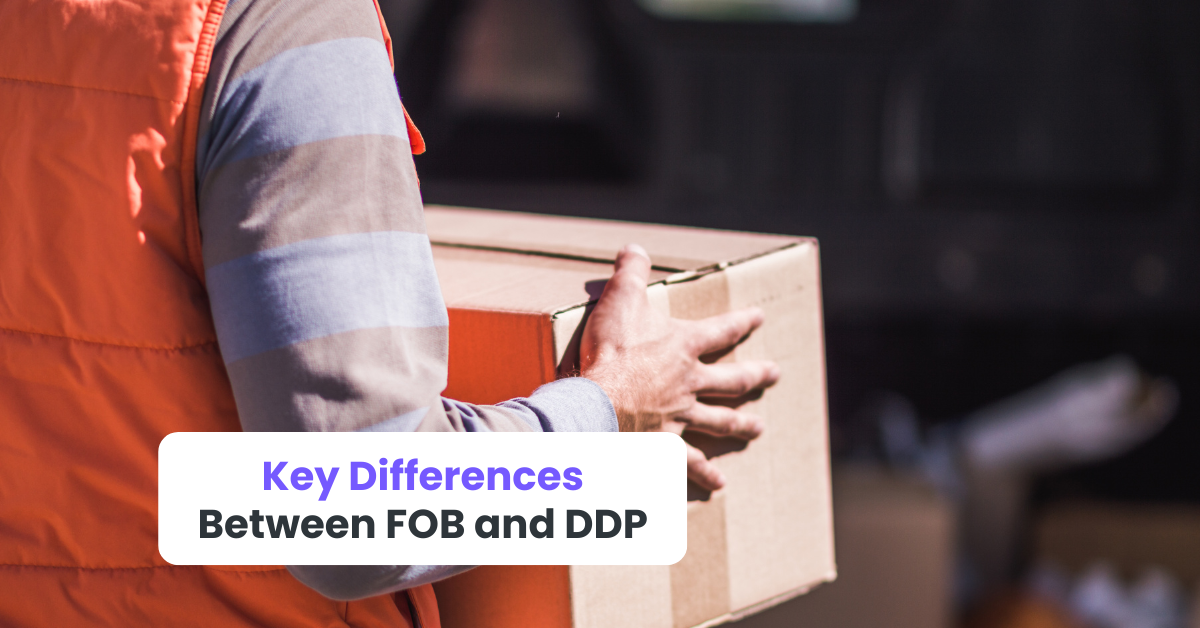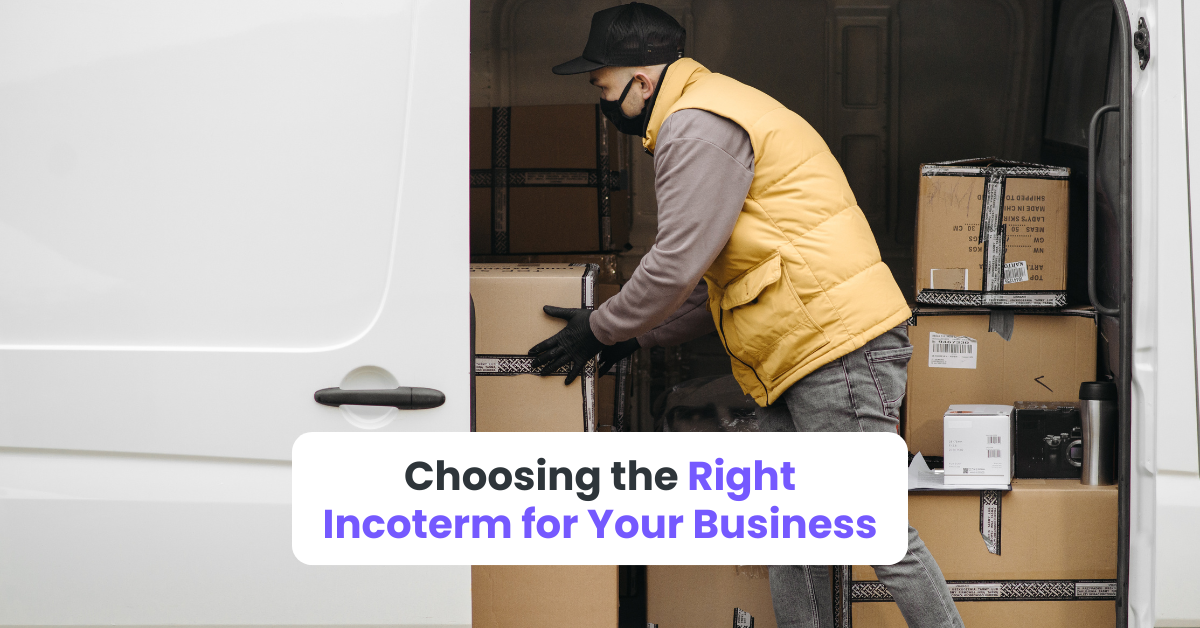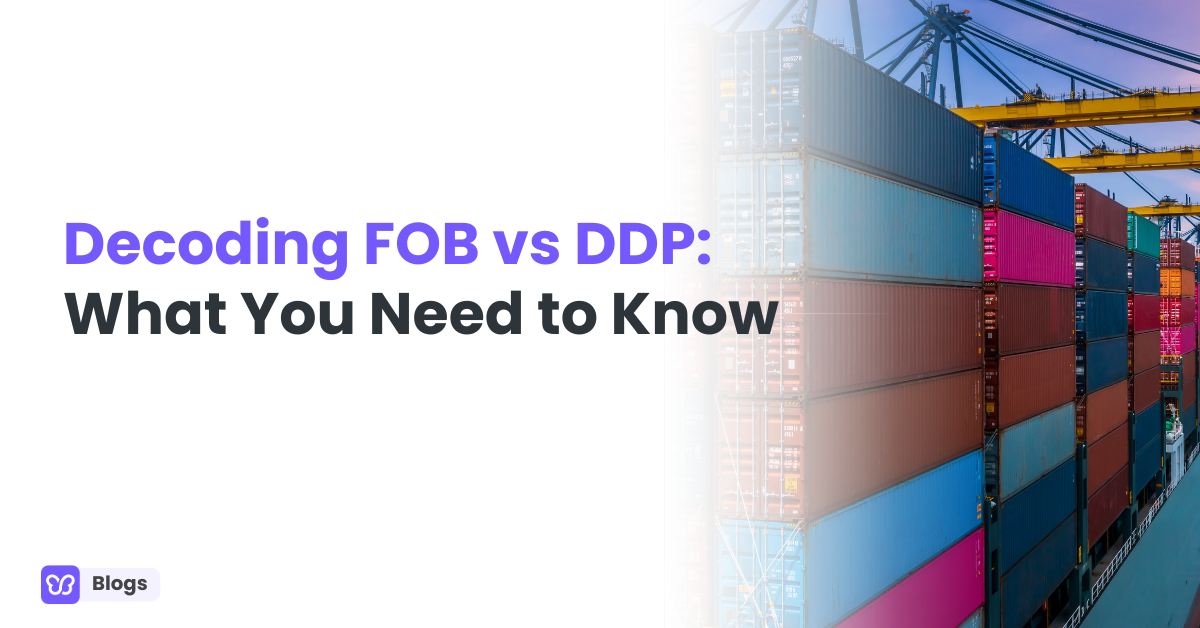Did you know that choosing between FOB and DDP can significantly affect your bottom line in international trade?
In the realm of shipping and trade, FOB (Free On Board) and DDP (Delivered Duty Paid) are crucial in co-terms that define the responsibilities and costs between buyers and sellers in global transactions.
Understanding the distinctions between FOB and DDP is paramount for businesses navigating the complexities of international trade. Misinterpreting these terms can lead to unexpected costs, delays, and legal issues.
This blog will delve into the nuances of FOB vs DDP, exploring their implications on pricing, risk allocation, and overall logistics. We will discuss the advantages and drawbacks of each incoterm, providing insights to empower businesses in making informed decisions. Let's unravel the intricacies of FOB
Table of Contents
-
Did you know that choosing between FOB and DDP can significantly affect your bottom line in international trade? In the realm of shipping and trade, FOB (Free On Board) and DDP (Delivered Duty Paid) are crucial in co-terms that define the responsibilities
-
Exploring DDP (Delivered Duty Paid)
-
Key Differences Between FOB and DDP
-
Impact on Freight and Transportation Costs
-
Choosing the Right Incoterm for Your Business
Did you know that choosing between FOB and DDP can significantly affect your bottom line in international trade? In the realm of shipping and trade, FOB (Free On Board) and DDP (Delivered Duty Paid) are crucial in co-terms that define the responsibilities

Free On Board, or FOB, is a word used commonly in international commerce related to transportation and logistics. It denotes the moment at which the buyer assumes responsibility for the items being transported and the seller meets their commitment. From the point of FOB, the buyer bears all expenses and risks; the seller bears responsibility for insurance, transportation, and loss risk up to that point.
FOB Origin and FOB Destination are important to FOB shipping sites. To minimize disagreements during the shipping process, buyers and sellers must have a clear understanding of FOB to ascertain responsibilities, expenses, and risks related to goods transportation.
In international commerce contracts, FOB, or free on board, is an Incoterm that specifies the obligations and liabilities of both buyers and sellers with relation to the shipment of products. Costs associated with loading, import clearance, export clearance, and delivery to the designated port are all the seller's responsibility.
Costs associated with transit, import clearance, and loss or damage risk are the buyer's responsibility. Cost repercussions, risk distribution, pragmatic and legal issues, and logistics planning are among the consequences for both sides.
Until the items are placed aboard the vessel at the appointed port, the seller assumes all risk of loss or damage; during transportation, the buyer is responsible for taking precautions against any dangers. Comprehending these ramifications facilitates cost management, risk mitigation, and seamless transactions from shipment delivery.
Pros and Cons of Free On Board (FOB) in International Transactions
Pros:
- Clear Division of Responsibilities: FOB outlines the responsibilities of the seller and buyer regarding the shipment of goods.
- Cost Control for Seller: The seller's responsibility ends once the goods are loaded onto the vessel at the port of shipment (FOB point).
- Flexibility in Choosing Carrier and Route: The buyer has the flexibility to choose the carrier, route, and insurance options that best suit their needs and budget.
- Lower Product Costs for Buyer: FOB shifts the responsibility for transportation costs to the buyer from the FOB point onwards, potentially lowering overall purchase costs.
- Risk Management: FOB allows both parties to manage risks more effectively.
Cons:
- Complex Logistics for Buyer: Buyers must manage and bear the costs of transportation, insurance, and any other charges from the FOB point onward.
- Risk of Damage or Loss During Transit: Once the goods are loaded at the FOB point, the buyer assumes the risk of damage or loss during transportation.
- Dependency on Seller’s Actions: Delays or errors on the seller's part can affect the entire shipping process and potentially incur additional costs for the buyer.
- Higher Upfront Costs for Buyer: Buyers may face higher upfront costs due to the need to arrange and pay for transportation, insurance, and import duties immediately after the goods are loaded at the FOB point.
- Limited Control for Seller After Loading: Once the goods are loaded onto the vessel at the FOB point, sellers have limited control over the shipment's safety and timely arrival at the destination.
FOB (Free On Board) terms are used in international transactions to clearly define responsibilities and risks between sellers and buyers at the specified point of shipment. For example, a Chinese electronics manufacturer sells smartphones to a buyer in the USA on FOB terms, with the seller responsible for packaging, delivering, and arranging export clearance.
The risk of loss or damage transfers to the buyer, who is responsible for paying ocean freight, insurance, and handling import customs clearance. If the goods are damaged or lost during transit, the buyer bears the financial consequences. Similarly, a Brazilian agricultural company exports coffee beans to a buyer in Europe using FOB terms, with the seller covering packaging, loading, and obtaining export licenses.
The buyer assumes responsibility for paying ocean freight, arranging for insurance coverage, and handling import customs clearance upon arrival in Europe. Understanding these dynamics is crucial for effective cost management, risk mitigation, and smooth transactions in global trade.
Exploring DDP (Delivered Duty Paid)
DDP, or Delivered Duty Paid, is an Incoterm used in international trade contracts to outline the responsibilities and obligations of the seller and buyer regarding the delivery of goods. It represents the maximum obligation for when goods reach the seller, covering all costs, including duties, taxes, and customs clearance.
The seller is responsible for delivering the goods to the buyer's premises, arranging and paying for transportation, and bears all costs and risks associated with the process. They are also responsible for paying import duties, taxes, and customs charges required for the goods to be imported into the buyer's country.
The seller must handle all customs formalities necessary for exporting and importing the goods. The seller bears all risks associated with the goods until they are delivered to the buyer's designated place of destination.
DDP terms provide convenience for the buyer, but also involve complexity for the seller, including compliance with import regulations and payment of duties/taxes. Understanding these terms is crucial for effective negotiation and execution of transactions.
The difference between DDP (Delivered Duty Paid) and FOB (Free On Board) in international trade is significant. DDP involves higher costs for the seller, including transportation costs, customs duties, taxes, and clearance fees. The buyer typically incurs fewer direct costs since the seller is responsible for covering all expenses up to the point of delivery.
In contrast, FOB (Free On Board) ends the seller's responsibility once the goods are loaded onto the transport vehicle at the designated port of shipment. From the FOB point onward, the buyer assumes responsibility for transportation costs, import duties, taxes, and other charges. The risk of loss or damage to the goods is shared between the seller and buyer.
The choice between DDP and FOB depends on factors such as financial capabilities, risk tolerance, and logistics management. Both Incoterms offer distinct advantages and considerations for international transactions.
In order for sellers to handle logistics and import law compliance, DDP conditions are an essential component of international trade. For example, when machinery is imported into Canada from Germany, the transportation, tariffs, and customs clearance are arranged and paid for by the seller pays the German supplier.
This simplifies the procedure and frees up the buyer to concentrate on operations rather than handling intricate foreign logistics. A Japanese provider oversees import and export customs clearance for pharmaceutical exports from India to the USA, guaranteeing adherence to US laws. This Incoterm offers administration simplicity, predictability, and clarity.
Key Differences Between FOB and DDP

The terms Free On Board (FOB) and Delivered Duty Paid (DDP) differ in the allocation of responsibilities, costs, and risks between sellers and buyers in international trade. In FOB, the seller is responsible for delivering goods to the agreed port of shipment, covering costs up to this point, including export duties, taxes, and local transport. The buyer assumes responsibility for transportation costs, insurance, and any risks associated with the shipment.
In DDP, the seller is responsible for delivering the goods to the buyer's named place of destination, handling all aspects of shipping cost of transportation, including export and import customs clearance. The buyer receives the goods at their specified destination and assumes ownership and responsibility upon delivery.
Key considerations for choosing between FOB and DDP include logistical complexity, cost predictability, and risk management. FOB shifts risk to the buyer earlier in the shipping process, while the DDP shipping side keeps more risk with the seller until goods are delivered. Choosing between these terms depends on factors such as logistical capabilities, risk tolerance, and preferences for cost management in international trade transactions.
Impact on Freight and Transportation Costs
DDP terms significantly impact freight and transportation costs in international trade, affecting both buyers and sellers. Sellers are responsible for transportation costs, including freight charges, insurance, and other fees. This impacts pricing strategy, as sellers must negotiate favorable shipping rates and insurance premiums to maintain profitability. Efficient logistics management helps minimize transportation costs and ensures compliance with delivery timelines.
Buyers benefit from cost predictability, as they do not bear direct costs of transportation from the seller's premises to the destination. They also benefit from cost management, as the seller covers all transportation costs, insurance, duties, and taxes up to delivery.
Clear communication and documentation are essential to address any issues during transit. DDP terms enhance efficiency in international trade by streamlining logistics and minimizing administrative burdens. Efficient logistics management and cost-effective transportation solutions are crucial for both parties to maximize the benefits of DDP trade terms in international trade.
Choosing the Right Incoterm for Your Business

The best Incoterm for your company will rely on several variables, including your total cost structure, risk management plan, and business capabilities. You can select the best course of action by having a thorough understanding of your logistical competence, financial resources, risk tolerance, customer expectations, cost implications, and contractual and legal concerns. EXW, FOB, CIF, and DDP are examples of common Incoterms; which one to use will depend on your company's capacity and risk tolerance.
Master FOB vs DDP: Your Key to Efficient Transportation
In international trade transactions, Incoterms like FOB, DDP, EXW, and CIF define responsibilities, costs, and risks between sellers and buyers. Factors to consider include logistics capacity, risk management, cost implications, customer expectations, and legal and contractual clarity.
Common Incoterms include EXW (Ex Works), FOB (Free On Board), CIF (Cost, Insurance, Freight), and DDP (Delivered Duty Paid). The decision-making process involves assessing logistical capabilities, risk tolerance, financial resources, customer expectations, and the level of service desired. Ensure legal and contractual clarity by defining responsibilities and obligations clearly in sales contracts.
Each Incoterm has its advantages and considerations, impacting costs, logistics management, and customer satisfaction. Balancing these factors is crucial for enhancing operational efficiency and meeting customer expectations.



 Ricky Hayes
Ricky Hayes


 Trisha Ballesteros
Trisha Ballesteros